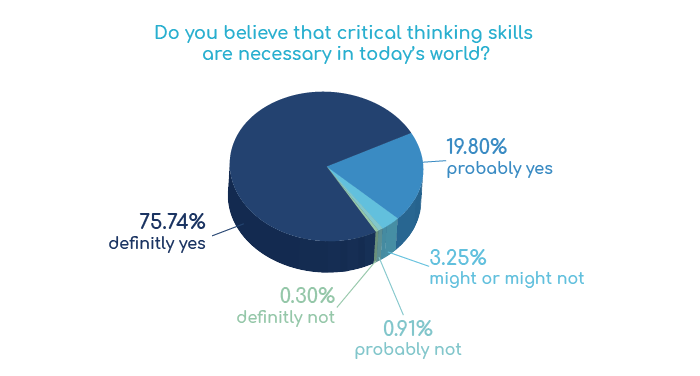Update: This article was last updated on 8th January 2026 to reflect the accuracy and up-to-date information on the page.

In today’s world, young people receive bulk of information from various sources, which can make it challenging for them to navigate effectively. From media to social media, peer pressure to societal norms, many factors can influence their thoughts and actions.
That’s why it’s more important than ever for young minds to develop the skill of rational thinking.
The ability to think rationally and objectively is crucial to make informed decisions and forming opinions that are backed by evidence and reason. It involves questioning everything, considering multiple perspectives, and using evidence to support beliefs and decisions.

This critical skill enables young people to analyze information, evaluate arguments, and identify biases.
In everyday life and problem-solving, the importance of rational thinking cannot be overstated. But what is rational thinking exactly, and why does it matter for students, professionals, and lifelong learners? In this 2026 guide, we explore how rational thinking helps people make clearer, evidence-based decisions.
1. Question Everything:
A vital element of rational thinking is questioning everything. Instead of taking something at face value, it entails critically and objectively evaluating the facts. Challenge presumptions, recognize biases, and seek evidence to support our opinions and decisions. It’s crucial to understand that asking questions about everything does not imply cynicism or mistrust of what we read or hear. Instead, it entails exercising skepticism and curiosity while looking for evidence to support or contradict what we are told.
Recommended Reading: Rational Thinking – A Skill For Young Minds
2. Consider All Perspectives:
Examining a subject or issue from multiple angles and considering other points of view, even if we may disagree with them, are all aspects of considering all perspectives.
We can better grasp a situation, spot biases or assumptions, and build more well-rounded and knowledgeable opinions by considering all available viewpoints.
During this exercise, we could come across concepts contradicting our viewpoints or beliefs. It’s crucial to keep an open mind and be willing to explore new ideas, even when this can be uncomfortable.
Recommended Reading: How to Train Your Child to be a More Rational Thinker!
3. Use Evidence:
We are less likely to be influenced by feelings, biases, or false information when we utilize evidence to support our views and decisions. It also enables us to assess information with greater objectivity and objectivity.
For instance, when choosing a choice, we may analyze the advantages and disadvantages of various possibilities, obtain information on possible outcomes, and consider the experiences of others who have dealt with comparable circumstances.
We must be aware of potential biases or restrictions in our data since the evidence is unreliable.
Recommended Reading: 10 Ways to Enhance Logical Thinking in Kids
4. Avoid Emotional Reasoning:
Emotional reasoning is a cognitive process involving decisions based on emotions rather than reason or evidence. While emotions are a natural and important part of being human, relying solely on them to make decisions can be problematic.
This is where rational thinking comes in – it helps us to avoid emotional reasoning and make decisions based on evidence, reason, and logic. To avoid emotional reasoning, it’s important to be aware of our emotions and how they might influence our decisions.
5. Practice Critical Thinking:
By engaging in critical thinking exercises, we can improve our decision-making skills and our ability to approach issues with an open, analytical mentality.
Once again, we should challenge presumptions, consider opposing viewpoints, and look for evidence to support our opinions if we engage in critical thinking.
This can entail assessing the reliability of our information sources, evaluating the merits and demerits of arguments, and seeing any potential biases or logical fallacies.
We can make more informed and effective decisions by developing analytical skills and approaching problems with an open and curious mindset.
6. Seek Diverse Experiences:
Expanding our perception of the world and avoiding confirmation bias can be achieved through exposure to a diverse range of viewpoints, cultures, and ideas. We can achieve this in various ways, such as traveling, interacting with people from diverse backgrounds, reading texts from various sources, or cultivating new interests and hobbies.
Actively seeking these experiences allows us to broaden our perspectives. For instance, by visiting a distant country, we can gain a better understanding of the local culture and question our preconceived notions about it.
Importance of promoting rational thinking in kids at early ages
Promoting rational thinking in children at early ages is crucial for several reasons, as it lays the foundation for their cognitive, emotional, and social development. Here are some key points highlighting the importance:
1. Foundation for Critical Thinking
Rational thinking fosters critical thinking skills, enabling children to analyze situations, make informed decisions, and solve problems effectively. These skills are essential for academic success and are valuable throughout life, helping individuals navigate complex situations with a clear and logical approach.
2. Improved Academic Performance
Children who develop rational thinking skills tend to perform better academically. They are more adapted to understanding and applying concepts, following logical sequences in subjects like mathematics and science, and comprehending complex texts. This strong academic base can open up more opportunities for higher education and career prospects.
3. Enhanced Emotional Regulation
Rational thinking helps children manage their emotions by encouraging them to consider the reasons behind their feelings and actions. This self-awareness and emotional intelligence enable them to respond to situations calmly and thoughtfully rather than reacting impulsively. As a result, they are better equipped to handle stress, conflict, and other emotional challenges.
4. Better Decision-Making Skills
Teaching children to think rationally encourages them to weigh the pros and cons of different options and foresee the potential outcomes of their choices. This skill is invaluable in helping them make sound decisions, avoid unnecessary risks, and take responsibility for their actions.
5. Enhanced Social Skills
Rational thinking promotes effective communication and empathy, as it encourages children to consider different perspectives and understand the reasons behind others’ actions. This understanding fosters empathy, respect, and cooperation, which are essential for building and maintaining healthy relationships. Children who think rationally are better at resolving conflicts and collaborating with others.
6. Encouragement of Lifelong Learning
By nurturing a rational mindset, children develop a love for learning and curiosity about the world around them. They become more inclined to seek out new information, ask questions, and challenge their own assumptions. This lifelong learning attitude is crucial in a rapidly changing world where continuous adaptation and knowledge acquisition are necessary for personal and professional growth.
7. Ethical and Moral Development
Rational thinking involves reflecting on one’s values and considering the ethical implications of decisions. Children who are taught to think rationally are more likely to develop a strong moral compass, make ethically sound decisions, and act with integrity. This ethical grounding is important for their personal development and for contributing positively to society.
Conclusion
Developing the ability to reason is essential for young minds to navigate a complex and interconnected world. By challenging assumptions, considering multiple viewpoints, utilizing evidence, avoiding emotional reasoning, and practicing critical thinking, young people can acquire a more discerning and deliberate approach to decision-making.
In today’s society, rational thinking is a crucial skill for success, whether it is for personal decision-making, evaluating information, or solving complex problems. By encouraging young people to improve their logical thinking abilities, we can prepare them for a future that demands creativity, adaptability, and critical thinking.
Moonpreneur understands the needs and demands this rapidly changing technological world is bringing with it for our kids.
Moonpreneur is on a mission to disrupt traditional education and future-proof the next generation with holistic learning solutions. Its Innovator Program is building tomorrow’s workforce by training students in AI/ML, Robotics, Coding, IoT, and Apps, enabling entrepreneurship through experiential learning.

























Why is it important for kids to learn this?
It helps them in so many ways! They can:
Make better choices: From healthy snacks to tackling homework challenges, rational thinking equips them to choose wisely.Avoid peer pressure: Thinking things through helps them stand up for themselves and make their own decisions.Solve problems like a pro: Whether it’s a disagreement with a friend or a tricky math question, using logic gets them to the best solution.
Rational thinking and logical thinking are essentially the same.
They are not the same. Philosophical rationalism, in its extreme form, holds that knowledge is based on pure reason, while logicism asserts that concepts like mathematics can be reduced to pure logic.
First, the meaning of rational thinking should be added in the blog so that if a beginner is reading this blog, will get an idea what exactly rational thinking is. Only then, students will realize its importance.
Rational thinking is the ability to think rationally. In simple words, it can be stated as “thinking by considering all evidences & reasons without being impulsive”. To understand this concept better, let’s take an example, Suppose you are searching for best coding classes. So, instead of directly jumping into the classes, a rational thinker would first attend the workshop, thereafter will analyze all the facts considering pros and cons. Then only, he will enroll themselves in program.
Though rational thinking helps in the decision making process. But at the same time it delays decision making as it is a time consuming process.